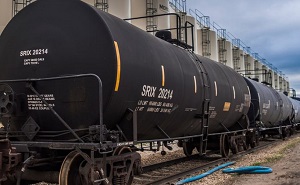Trump Backs Canada-Alaska Rail to Free Landlocked Oil, but Project Faces High Hurdles
WASHINGTON (Reuters) - A private-sector proposal endorsed by U.S. President Donald Trump to build a railway from Canada's oil sands to ports in Alaska would free landlocked crude but faces numerous steep challenges.

Trump wrote on Twitter over the weekend that he would issue a permit for the Alaska-Alberta Railway Development Corporation (A2A Rail) project to move Alberta crude 1,600 miles (2,570 km) to the Alaskan coast, as well as freight in the other direction.
"I will be issuing a Presidential Permit for the A2A Cross-Border rail," Trump said. He said his decision was based on the recommendation of fellow Republicans Dan Sullivan, a U.S. senator, and Don Young, a U.S. representative. Projects that cross the U.S. border require presidential permits.
The $17 billion project was first proposed in 2015 by Canadian infrastructure financier Sean McCoshen.
Much of the case for it has been often-congested pipelines that move Alberta crude to U.S refineries. However, new pipelines are under construction, reducing the urgency for another transportation option.
Options to move crude from Canada, the world's fourth-largest producer, are useful, but A2A is "a very challenged project," said Dennis McConaghy, a former pipeline executive at TransCanada Corp, now known as TC Energy Corp .
Transportation costs to reach U.S. Gulf Coast refiners would be substantially higher than pipeline tolls, he added.
"This project makes sense if it’s absolutely the last resort, and the price of oil is substantially higher than it is today," McConaghy said.
A2A would require numerous regulatory clearances in the United States and Canada that would likely take years. The company could not be reached.
Shipping oil by rail has caused several high-profile accidents in both Canada and the United States in recent years.
"At a time when California is banning gas-powered cars and China is pledging to transition off fossil fuels, it’s hard to imagine a bigger waste of money than building a rail line to move oil trains over the melting permafrost," said Keith Stewart, senior energy strategist at Greenpeace Canada.
The White House did not respond to a request for comment on how soon Trump would issue the permit.
Such a rail link "has been a dream for many generations," said Alaska Governor Mike Dunleavy in a statement. Funded privately, it would reduce Alaska's costs of goods and services, he said.
Alberta supports A2A as it would unlock new markets for the province's exports, said Kavi Bal, senior press secretary for its energy ministry.
It is my honor to inform you that I will be issuing a Presidential Permit for the A2A Cross-Border rail," Trump wrote on Twitter. He said his decision was based on the recommendation of fellow Republicans Dan Sullivan, a U.S. senator, and Don Young, a U.S. representative. Projects that cross the U.S. border require presidential permits.
The $17 billion Alaska-Alberta Railway Development Corporation (A2A Rail) project, first proposed in 2015 by Canadian infrastructure financier Sean McCoshen, would move crude from the Alberta oil sands 1,600 miles (2,570 km) to the Alaskan coast, as well as freight in the other direction.
Much of the case for the project has been often-congested pipelines responsible for moving Alberta crude to U.S refineries. However, new pipelines are under construction, reducing the urgency for another transportation option, and European producer BP Plc recently questioned whether global oil demand has already peaked.
Once a permit is issued, A2A would require numerous regulatory clearances in the United States and Canada that would likely take years. The company could not immediately be reached.
Shipping oil by rail has caused several high-profile accidents in both Canada and the United States in recent years, leading to criticism about the practice by some environmental groups.
The White House did not immediately respond to a request for comment on how soon Trump would issue the permit.
The office of Alaska Governor Mike Dunleavy did not immediately respond to a request for comment.
Canadian energy companies have complained that Canada's regulatory system is too sluggish, and proposed oil pipelines have run into opposition from environmental and indigenous groups in both Canada and the United States.
Trump issued a permit and an executive order in attempts to speed TC Energy Corp's Keystone XL pipeline project to bring oil sands crude to U.S. refiners, but it has been mired in delays.
Related News
Related News

- Keystone Oil Pipeline Resumes Operations After Temporary Shutdown
- Freeport LNG Plant Runs Near Zero Consumption for Fifth Day
- Biden Administration Buys Oil for Emergency Reserve Above Target Price
- Mexico Seizes Air Liquide's Hydrogen Plant at Pemex Refinery
- Enbridge to Invest $500 Million in Pipeline Assets, Including Expansion of 850-Mile Gray Oak Pipeline
- Evacuation Technologies to Reduce Methane Releases During Pigging
- Editor’s Notebook: Nord Stream’s $20 Billion Question
- Enbridge Receives Approval to Begin Service on Louisiana Venice Gas Pipeline Project
- Mexico Seizes Air Liquide's Hydrogen Plant at Pemex Refinery
- Russian LNG Unfazed By U.S. Sanctions




Comments